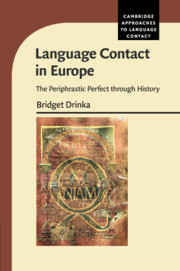Book contents
- Frontmatter
- Contents
- Series Editor's Foreword
- Acknowledgments
- Abbreviations, Based on the Leipzig Glossing Rules
- 1 Language Contact in Europe: The Periphrastic Perfect through History
- 2 Languages in Contact, Areal Linguistics, and the Perfect
- 3 The Perfect as a Category
- 4 Sources of the Perfect in Indo- European
- 5 The Periphrastic Perfect in Greek
- 6 The Periphrastic Perfect in Latin
- 7 The Charlemagne Sprachbund and the Periphrastic Perfects
- 8 The Core and Peripheral Features of the Romance Languages
- 9 The Early Development of the Perfect in the Germanic Languages
- 10 The Semantic Shift of Anterior to Preterite
- 11 The Balkan Perfects: Grammaticalization and Contact
- 12 Byzantium, Orthodoxy, and Old Church Slavonic
- 13 The l- perfect in North Slavic
- 14 Updating the Notion of Sprachbund: New Resultatives and the Circum- Baltic “Stratifi ed Convergence Zone”
- 15 The have Resultative in North Slavic and Baltic
- 16 Conclusions
- Notes
- Bibliography
- Index
1 - Language Contact in Europe: The Periphrastic Perfect through History
Published online by Cambridge University Press: 23 February 2017
- Frontmatter
- Contents
- Series Editor's Foreword
- Acknowledgments
- Abbreviations, Based on the Leipzig Glossing Rules
- 1 Language Contact in Europe: The Periphrastic Perfect through History
- 2 Languages in Contact, Areal Linguistics, and the Perfect
- 3 The Perfect as a Category
- 4 Sources of the Perfect in Indo- European
- 5 The Periphrastic Perfect in Greek
- 6 The Periphrastic Perfect in Latin
- 7 The Charlemagne Sprachbund and the Periphrastic Perfects
- 8 The Core and Peripheral Features of the Romance Languages
- 9 The Early Development of the Perfect in the Germanic Languages
- 10 The Semantic Shift of Anterior to Preterite
- 11 The Balkan Perfects: Grammaticalization and Contact
- 12 Byzantium, Orthodoxy, and Old Church Slavonic
- 13 The l- perfect in North Slavic
- 14 Updating the Notion of Sprachbund: New Resultatives and the Circum- Baltic “Stratifi ed Convergence Zone”
- 15 The have Resultative in North Slavic and Baltic
- 16 Conclusions
- Notes
- Bibliography
- Index
Summary
Introduction
My goal in writing this book is twofold: to present the history of a multifaceted verbal construction, the periphrastic perfect (e.g., I have seen in English, nous sommes venus ‘we have come’ in French) as it developed in Europe, and to demonstrate the essential role played by language contact at all stages of this development. The book is a chronological account of the development of the European periphrastic perfect from its earliest attestations in ancient Greek to the various constructions found in the present-day European languages. It is also an attempt to demonstrate that contact is a more crucial factor in linguistic change than has generally been recognized.
The perfect itself has been defined in a number of ways (see Chapter 3 for a fuller discussion), but Comrie's (1976: 52) simple definition offers a useful starting point: “[T]he perfect indicates the continuing present relevance of a past situation.” Bybee, Perkins, and Pagliuca (1994: 55) choose the term anterior for this category, to avoid confusion with the similar-sounding perfective aspect. In this book, however, anterior will be used only when precise reference is made to the semantic value of the perfect as a marker of a past situation with present relevance; the generally accepted term perfect will be used otherwise, in reference to the broad category.
The term periphrastic refers to the fact that the present perfect construction in most European languages is not synthetic, but is made up of an auxiliary + a participial main verb, with the most frequent perfect auxiliaries in Europe being HAVE and BE. The present perfect of English, in maintaining its anterior meaning, has been classified as a prototypical perfect (Dahl 1985: 129–31, Bybee et al. 1994: 61, pace Kortmann 1995: 195), bringing present relevance to past situations:
(1) Housing prices have fallen rapidly in the past two years (and so this might be a good time to buy a house).
(2) Bach has played an immense role in shaping musical tastes in the West. (Though he is no longer alive, his music continues to exert infl uence.)
- Type
- Chapter
- Information
- Language Contact in EuropeThe Periphrastic Perfect through History, pp. 1 - 23Publisher: Cambridge University PressPrint publication year: 2017
- 1
- Cited by

